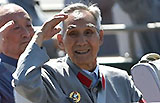Potential historic Iranian nuclear deal still possible
(Xinhua) Updated: 2015-09-13 16:57VIENNA - As Iranian nuclear talks entered the final days in Austria, top diplomats from Iran and the West were desperately trying to seize the best opportunity they've had in 35 years to clinch a historic deal which could change the political landscape in the Middle East.
Top nuclear negotiators from Iran and the P5+1 group (five permanent members of the UN Security Council plus Germany) left meetings in Vienna on Friday to further discuss with their colleagues the issues surrounding the potential deal over the weekend.
After the weekend debriefing, negotiators were expected to come to the negotiation table with political decisions.
In July of this year, Iran and the P5+1 decided to postpone the resolution deadline to Nov. 24 as a solution to the debate had not been resolved.
The touchy subject in the current round of talks was how to bridge gaps on some key issues over the size and scope of Iran's nuclear program, especially uranium enrichment capacity, and the speed of sanction relief.
Negotiators were aiming to reach a comprehensive solution by Monday that would ensure Tehran's atomic plan is exclusively peaceful, while in return, the West would phase out sanctions which have severely hurt the gulf nation's oil-dependent economy.
However, the gap between opposing views seemed to narrow after intensive meetings between US Secretary of State John Kerry, his European counterparts, and Iranian Foreign Minister Mohammad-Javad Zarif.
With the deadline approaching, it could be tough to find a magic solution to these key issues in the remaining days, unless there is some flexibility on both sides.
The question remained whether Iran and the West would be able to come to an agreement. As both sides have never been as politically close since the 1979 revolution in Iran as they are presently, there has been great diplomatic effort made over the past year to end the stand-off and no one wants to miss this unique opportunity to resolve the issue.






